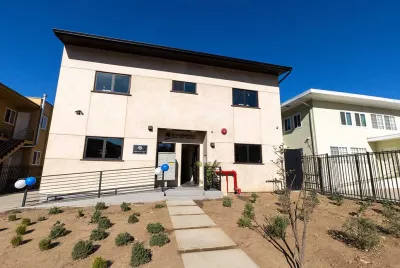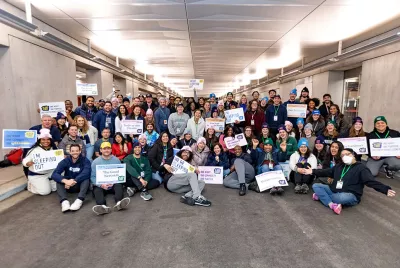Healthy Food, Brighter Futures Are Growing at Covenant House Greater Washington
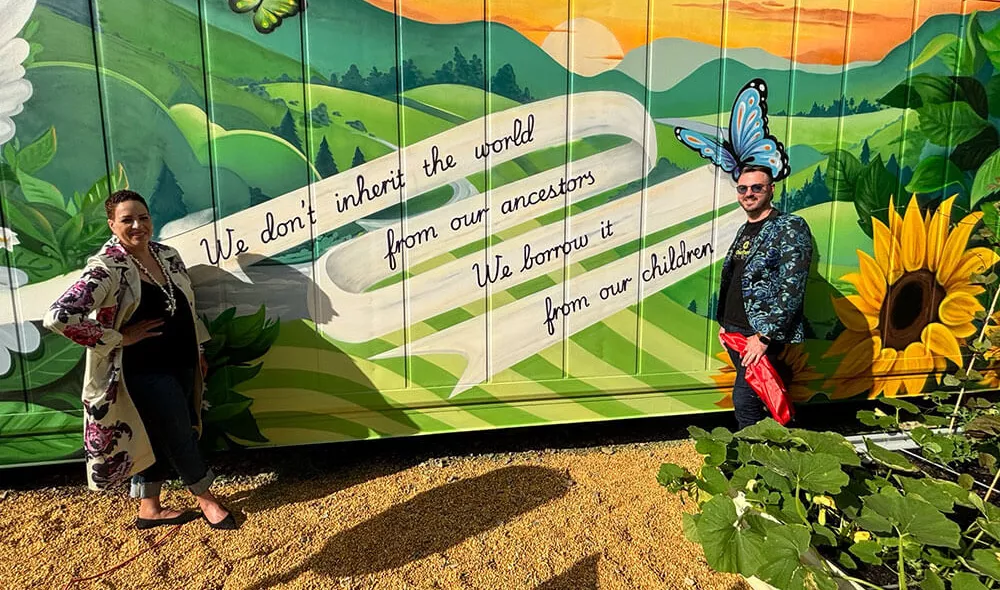
“In just one year, we transformed the lives of our youth by providing them with opportunities to learn sustainable farming, food preparation, and landscaping, while nourishing their bodies and spirits with fresh, nutrient-dense produce,” says Covenant House Greater Washington CEO Angela Jones-Hackley about the impact of CHGW’s unique-to-Washington-D.C. hydroponic farm.
Installed in an 8-ton shipping container in CHGW’s backyard in Southeast D.C. in October 2023, the farm has yielded thousands of pounds of year-round, fresh produce for our young people and food-insecure communities in the U.S. capital. The container farm has grown a spinoff outdoor garden, invaluable community partnerships, and new career opportunities for our youth.
CHGW and our urban farming partner, OurFarm, say it’s still just the beginning. “The partnership between Covenant House Greater Washington and OurFarm is a testament to what can be achieved when we blend innovation with a commitment to community impact,” Angela says.
From Our Farm to Our Tables, Feeding Our Youth and Communities
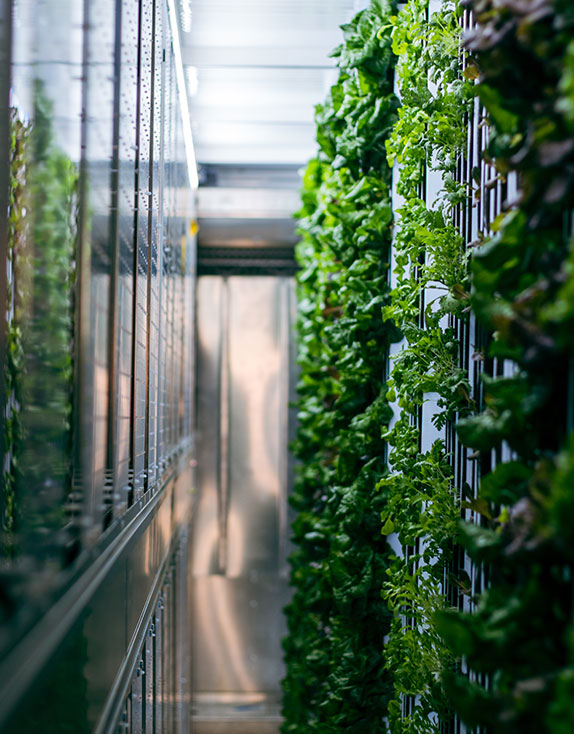
Just two months after the container was hoisted over the CHGW service center, the first crop (mustard greens) was harvested. Since then, says Mike Johnson, OurFarm founder, “We’ve experimented with many different varieties of leafy greens, lettuces, herbs, root vegetables, microgreens, and edible flowers within the container farm.” Crops include, among many others, kale, Thai basil, cilantro, beets, radishes, dill, fennel, scallions, and marigolds.
“We’ve also constructed an outdoor garden space that surrounds the container farm, which allows us to grow an even more diverse mix of produce seasonally, all of which goes to CHGW’s kitchens. We grow peppers, tomatoes, eggplants, beans, peas, watermelons, cucumbers, flowers, lettuces, Swiss chard, squash, and herbs,” Mike says.
At its max capacity, he adds, the container farm can harvest over 100 pounds of produce per week (mostly lettuces). “We estimate that we’ve grown more than 4,000 pounds of produce in the year since the farm became operational, including what we harvested from the outdoor garden.” Of all that produce, 20-30% goes directly to CHGW — to our kitchens for regular meals and to packaged salad kits for distribution through our community pantry.
The creation of the outdoor garden sanctuary was, for Mike, one of the greatest impacts of the partnership with our site over the past year. “The garden transformed the unused dirt lot that sits behind CHGW into a productive organic garden and activity space,” he says.
Three young people from our Shine residence helped design a mural for the outside of the container housing the hydroponic farm. The design depicts rolling farmlands, oversized flowers, and a beautiful quote that reminds us that our young people are our future: “We don’t inherit the world from our ancestors, we borrow it from our children.” In the photo at the top of this page, Angela and Mike flank either side of the mural.
Opening Career Paths
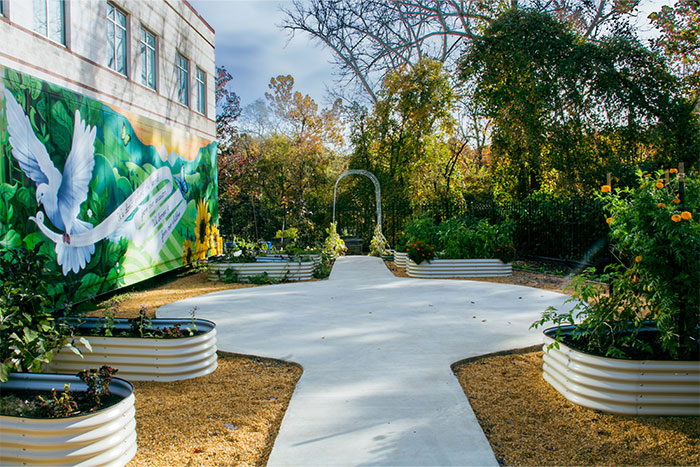
OurFarm and CHGW conceived of the hydroponic farm not only as a program to nourish youth today but one that would also give them and local community members tools they can use to build a bright future.
When Workforce Development Director Kevin Walker meets with new residents or community members stopping by our services center, he introduces them to the hydroponic farm. Those who are interested in working with the farm scan a QR code, fill out a form, and meet with Kevin for an interview to determine their interest and aptitude. Youth earn income while learning about farming, food preparation, organic gardening, landscaping, and more.
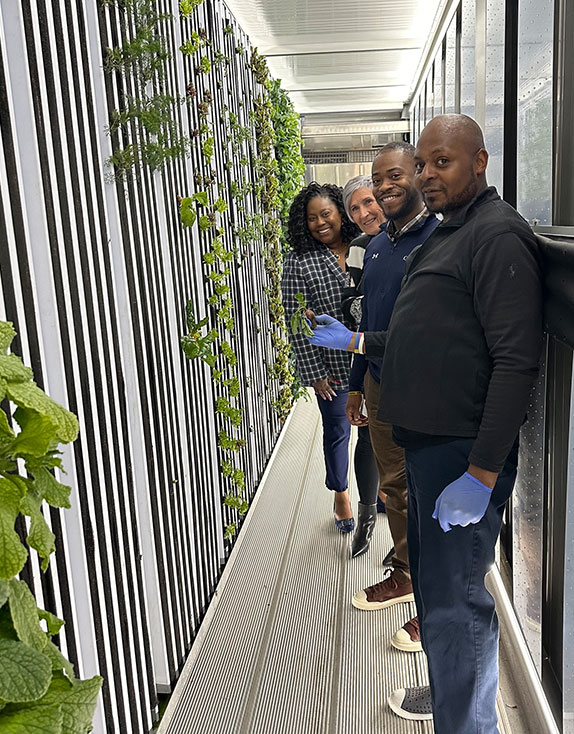
“Once they’re accepted into the program, they start all the safety training,” Kevin says. “This is where we combine about 100 hours of online job-readiness training through Covenant House partner Accenture plus classroom training with certifications. So, they get their food handlers and safe-serve licenses, OSHA certification, CPR certification, and their Urban Farming 101 training, including hydroponics.” Mike Johnson leads the latter.
That training is extensive, Kevin says. It begins with handling hydroponic seedlings in the seedling nursery and includes management of the container’s automated functions (water, light, and temperature controls), pruning, crop rotation, and, for the outdoor crops, composting and tilling.
“Because we’re trying to make this a farm-to-table experience, the food handlers license allows them to grab those salads and greens and bring them into the kitchen after sterilizing and washing them and so forth,” Kevin says. CHGW is partnering with the local fire department to run a concession stand at its bingo hall, which will give youth hands-on experience at the food service end of urban farming.
The farm has attracted youth and community members who access our services center, like James.
James had spent some years in prison and came to us as a “returning citizen” through a program called Run Hope Work. Trained as a carpenter, he was looking for work. When he was introduced to the idea of urban farming, he was all in.
“James was there from the beginning. He helped clear the land for the container. Then, once the container was placed, he applied for a job with OurFarm and became the first OurFarm employee to come through our program,” Kevin says. “Now he’s the manager.”
Stronger Communities, More Vibrant Neighborhoods
Angela underscores how the partnership with OurFarm is making an impact at CHGW and in surrounding areas. “Beyond benefiting our youth, this collaboration has extended its reach to the broader community, providing nutritious food and educational opportunities that foster stronger connections and more vibrant neighborhoods. By ensuring the farm and its harvest are accessible to all, we further solidify Covenant House Greater Washington’s legacy as a vital anchor institution in D.C.”
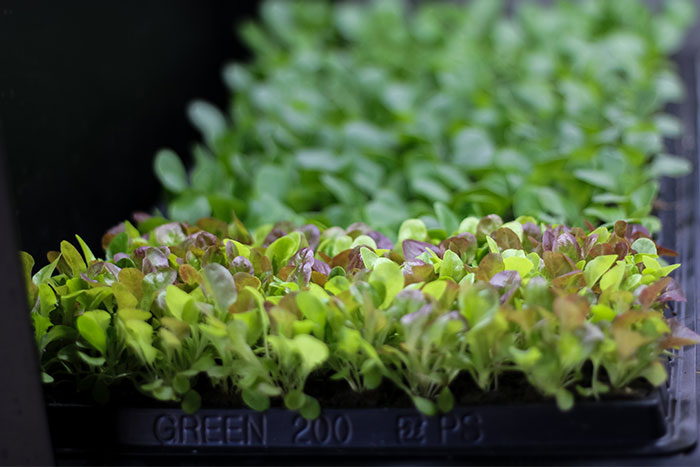
In addition to distributing fresh items through our community pantry, OurFarm also distributes the produce to a local nonprofit called Martha’s Table, which hosts a daily no-cost grocery for food-insecure individuals and families in the capital. To help cover some of the costs associated with the farm and garden operations, OurFarm also distributes the produce to four fine-dining restaurants, two farmers markets, and, increasingly, to local stores and cafes.
“We developed a line of salad kits that integrate our fresh greens and include a house-made dressing, cheeses, and healthy toppings,” Mike says. “And we partnered with Union Kitchen to help us launch the salad kits in stores and cafes across the D.C. area.”
Building a Brighter Future
Of the first year of harvests and programming, Mike says, “It’s been a really challenging but rewarding year. There was a huge learning curve getting the farm up and running, building distribution channels, and training employees to manage farm operations. I couldn’t be prouder of what we accomplished.”
Angela is already looking to the future. “I envision expanding this partnership to reach even more individuals, build sustainable food systems, and provide job opportunities for those we serve,” she says. “Together, we will grow more than produce. We will grow hope, resilience, and a brighter future for our community.”
Help Young People Build Brighter Futures
Your gift helps ensure we can continue to provide services and support to young people on their journey toward sustainable independence and a hope-filled future.
